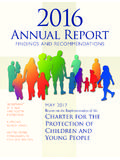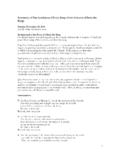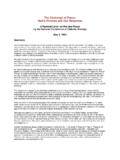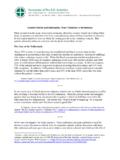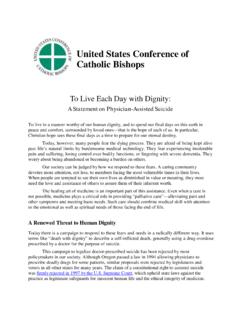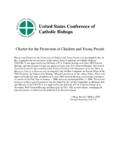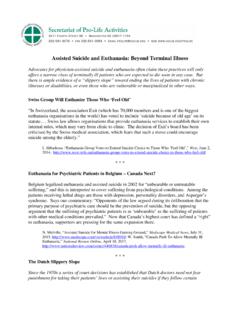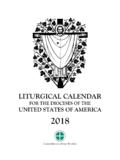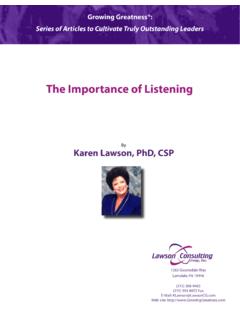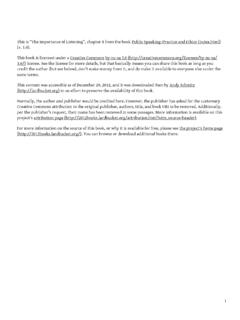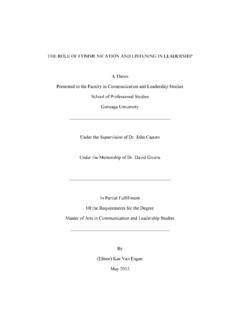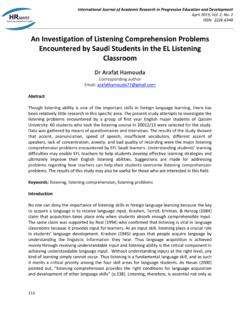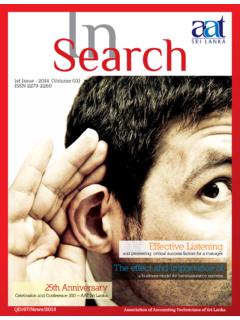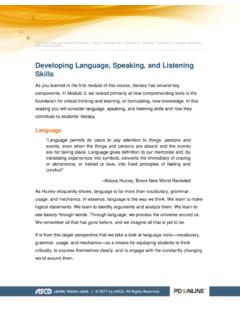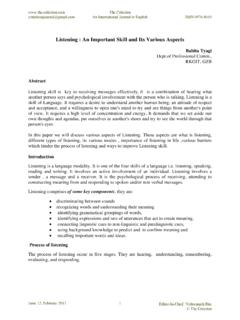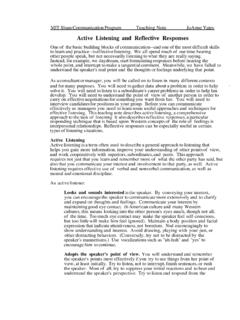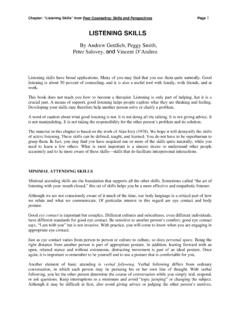Transcription of The Importance of Listening - usccb.org
1 The Importance of Listening : Spiritual Maturity in Interreligious Dialogue At a meeting such as ours today a diverse group reflecting the Generations of Faith we do a lot of Listening and speaking so as to get to know one another a bit better. I want to focus on one essential element in dialogue that is, the Importance of Listening . Listening is crucial to our relationship to one another and to our relationship with God. These relationships are intertwined. God can be speaking to us through one another. Listening to one another can be a complex process. Listening to the other requires attention. Yet attention can be hard there are lots of distractions around us from the noise of traffic to our sudden desire to send a text or check a website which pulls us away from our conversation.
2 We also can have inner distractions . emotions such as anger or elation can impair our ability to listen. In my years as a spiritual guide for others I have had to discipline myself to listen and to help other to overcome their inner and outer distractions so that they might listen to me. Listening is not just with our ears. It is with our head and our heart. When we encounter one another in dialogue we need to make a personal investment of our being. A distracted presence will not do take this from one who is given to distractions. [ when standing and talking to someone I can be easily distracted by someone who walks by.] We must encounter the other. We must make a commitment to the other and to the relationship. This requires a level of spiritual maturity. We need to root ourselves in our faith in God and devote ourselves to our daily prayer.
3 These are prerequisites to attentive Listening to the other. We must ask for divine help to listen and to understand. My experience of dialogue indicates that Listening is part of the journey of dialogue.' At first we just need to pay attention and to show the other person that we value what they say. Thus we need to be silent not answering back with our views but just accepting and focusing deeply on what the other person is telling you. 1 To do this we might have to change our habits of conversation. We will always have time later to say what we need to say. Deep Listening can lead us to deal with our obstacles. We may have within us resentments or angers or other things that impede dialogue. These may be personal. Our dialogue partners may have had a bad personal experience with a Catholic person or we might have had a bad experience with a member of their faith.
4 Bad experiences may still linger. After a number of conversations and some months or years of walking together, the hurt or injury comes to the surface, and has an opportunity to be healed. Healing prepares the way for deeper conversation and more profound relationship. Healing may need to occur on a communal level. Religious communities carry with them memories of past injuries. They may have happened decades or even centuries ago but they are still alive. Communities need to acknowledge wrongs done to one another and to forgive one another. Pope John Paul II was well known, and sometimes criticized, for acknowledging and apologizing for past wrongs done by Catholics. Such acknowledgement of the truth of the past can free all of us to move into the future together. We see this when communities revise their text books for children to reflect both truth and forgiveness helping the next generation to be free from resentment.
5 Dialogue can lead to mutual understanding. The Second Vatican Council of the Catholic Church, held in Rome, from 1962 to 1965 approved Nostra Aetate, the Declaration on the Relation of the Church to Non-Christian Religions. In this document the bishops say: The Catholic Church rejects nothing of what is true and holy in these religions. She has a high regard for the manner of life and conduct, the precepts and doctrines which, although differing in many ways from her own teaching, nevertheless often reflect a ray of that truth which enlightens all .2. We are looking for the truth together sharing our beliefs and deepest understandings with one another. This leads first to mutual understanding and 1. See Giovanna Pompele, Burden shared, burden halved, Living City, January, 2012, p.
6 30. 2. Section #2. then to mutual appreciation. Sometimes surprisingly we can even begin to see commonalities. Recently Father Thomas Michel, SJ put this well when he said: It is a mark of the maturity of the three national Muslim-Catholic dialogues that have been held over the past 16 years that we recognize our common commitment, as Muslims and Christians, to respond to the One God with the same sense of obedience, submission, worship, and trust that characterized the faith of Abraham. It is therefore proper that we look to Abraham as our common father in faith and that we come together to celebrate living our faith We also acknowledge our divergences and thus seek to build our dialogue on honesty and truth. In attentive dialogue we begin to see deeper into one another's understanding.
7 Dialogue requires us to examine our own faith more intently and to understand it better. Our conversation may even lead us to discover that we Catholics have been mistaken in our understanding of the beliefs of the Catholic Church. When we listen intently we may at time hear God speaking to us through our friend, our colleague in dialogue. The good example of the other, their dedication to their prayer and to a life of faith, can be an example for us. Often the example of the other leads us closer to God. What happens, sometimes almost imperceptibly, is that we move from being acquaintances to being colleagues to becoming friends. Friends, while differing, have an understanding and comfort with one another. They are happy to be with one another. John W. Crossin, OSFS. November 7, 2012.
8 3. Living our Faith Together: Muslim-Catholic National Plenary 2012/1433, Chicago, p. 1.
